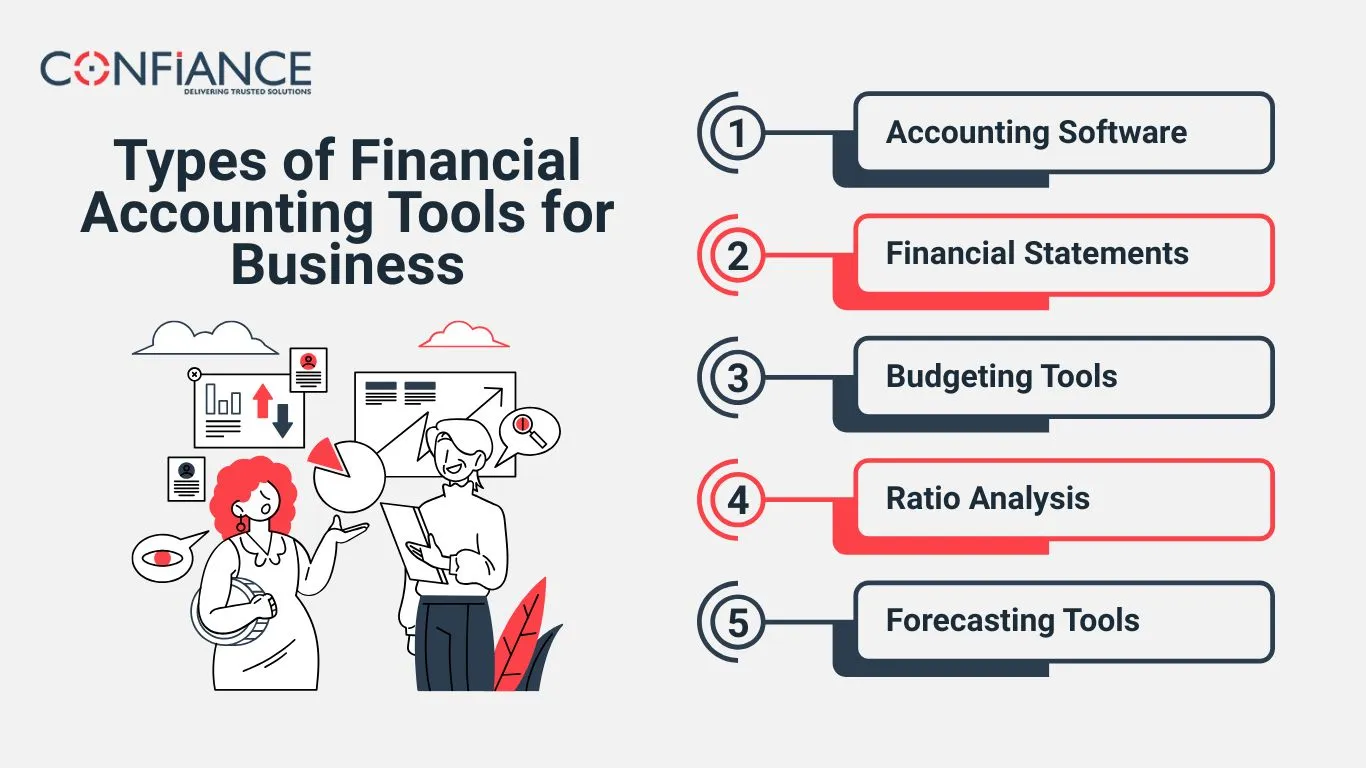
Key Financial Accounting Tools for Effective Business Decisions
Making the right business choices starts with clear numbers. Financial accounting gives owners, leaders, and managers the data they need to act well. From tracking income, costs, and cash flow to planning growth, strong accounting tools help at every step. Without them, decisions often rely on guesses, which can hurt both profits and business stability. Without them, decisions often rely on guesses, which can hurt both profits and stability.
In this blog, we will look at the top financial accounting tools that help firms make faster, smarter choices. You will learn what they are, why they matter, and how to use them for better results.
Why Financial Accounting is Important in Business
Business accounting is more than just a record of money coming in and going out. It is the backbone of smart business planning. With proper systems and tools in place, you can:
- Track profit and expenses clearly
- Manage risks with accurate insights
- Build trust with investors and lenders
- Plan for growth with real data
When owners and managers have reliable numbers, they can make decisions that support long-term success. That is why having the right accounting tools is vital.
Types of Financial Accounting Tools for Business
There are many tools in the world of finance. Some are software-based, while others are methods or reports. Below, we explore the most common financial accounting tools that make a direct impact on daily operations.
1. Accounting Software
Modern accounting software is a key financial tool. It makes data entry simple, runs reports fast, and cuts mistakes. Examples are QuickBooks, Xero, and FreshBooks.
Key benefits:
- Track income and costs in real time
- Make invoices automatically
- Store records safely in the cloud
- Prepare taxes easily
With software, businesses save time and work more accurately, which helps make faster choices.
2. Financial Statements
Financial statements are the main tool in accounting. They include the balance sheet, income statement, and cash flow statement.
Why they matter:
- The balance sheet shows assets, debts, and equity
- An income statement shows profit or loss
- The cash flow statement shows money coming in and out
These reports give a full view of a company’s money health.
3. Budgeting Tools
Budgets are useful accounting tools. They help owners set limits, track spending, and plan for growth.
Advantages of budgeting tools:
- Stop overspending
- Track costs versus income
- Plan for future growth
- Make smart money choices
With simple digital spreadsheets or advanced apps, businesses can align budgets with goals.

4. Ratio Analysis
Ratio analysis is a key method used in accounting. It involves comparing numbers to measure performance. Examples include profit margin, return on assets, and debt-to-equity ratio.
Why it helps:
- Shows how well the company uses resources
- Highlights risks in financing or liquidity
- Helps compare results with industry standards
For investors, ratio analysis gives clear insight into business strength.
5. Forecasting Tools
Business leaders often ask: “What will happen next?” Forecasting tools in accounting help answer that. These tools use past data to predict future sales, cash flow, or expenses.
Benefits:
- Guides investment choices
- Reduces uncertainty
- Helps prepare for market changes
Good forecasting gives companies a roadmap for the future.
How to Use Financial Accounting Tools Effectively
Owning the right tool is one thing, but using it right is what makes the real change. Here are the steps to get the most from financial accounting tools.
1: Keep Data Accurate
All reports rely on clean data. Always check that numbers are fresh and clear. Even the best tool cannot fix bad input.
2: Check Reports Often
Do not wait for year-end to look at results. Month by month, or even week by week, checks of Business accounting data help spot issues early.
3: Match Tools to Your Needs
A small start-up may only need plain software, while a big firm may need strong systems. Pick accounting tools that fit your size and field.
4: Train Your Team
Your staff must know how to use the tools well. Give short lessons and guides so they can handle input, reports, and updates with ease.
Benefits of Using Accounting Tools
Businesses that use these tools gain many clear benefits.
Improved Decision-Making
With correct and up-to-date data, leaders can act fast. Whether it is investing in new projects or cutting costs, choices are based on facts, not guesses.
Better Compliance
Tax rules can be hard to follow. Financial tools keep records clear and ready, making audits easier and safer.
Cost Savings
By automating tasks and finding errors fast, companies save money. Mistakes and missed details often cost more later.
Strong Investor Trust
Investors like clear numbers. Reports give them trust to back and fund your business.
Time Efficiency
Tasks that took hours can be done in minutes. Staff can focus on growth and plans, not routine work.
Risk Reduction
Early alerts on errors or odd trends help stop losses. Tools flag issues before they grow.
Better Planning
Tools help forecast cash and costs. Firms can plan budgets, hires, and projects with more certainty.
Easy Collaboration
With shared access to reports, teams and partners work smoothly, with less mix-up and delay.
Challenges in Using Accounting Tools
While useful, these tools also come with some hurdles.
High Setup Costs
Some advanced software and systems can be costly at the start. However, they often pay off in time and savings.
Learning Curve
Not all team members may adapt quickly to new tools. That is why training is key.
Data Security
With digital systems, there is always a risk of cyber threats. Companies must use secure networks and backups to keep data safe.
Future Trends in Financial Accounting Tools
The world of finance is changing fast with new tech. Here are some trends shaping Business accounting:
Cloud-Based Systems
More firms now use cloud systems for speed, ease, and low cost. These tools let users get data from anywhere.
AI and Automation
Smart AI helps cut human errors and speeds up jobs like scanning invoices and spotting fraud.
Mobile Access
With apps on phones, owners can check reports and approve bills even while moving or traveling.
Data Analytics
Tools now give clear charts and insights. This helps firms spot trends and make wise choices.
Integration with Other Tools
Accounting tools now link with payroll, banking, and sales apps, making work smooth and fast.
Tips to Choose the Right Business Accounting Tools
Every business is different, so picking the right tools is key to smooth work and clear financial records.
Identify Your Goals
Know why you need the tool. Is it for daily spending, budgets, or future planning? Clear goals help you pick the best tool.
Compare Options
Look at different software and ways to work. Try free trials, watch demos, and check what fits your business needs.
Check for Support
Make sure the provider gives help, updates, and guides. Good support keeps your system running smoothly and avoids future problems.
Keep It Scalable
Pick tools that can grow with your firm. As sales or staff rise, the system should fit without forcing costly changes.
Test for Ease of Use
Choose tools that your team can use quickly. Simple software saves time, cuts errors, and makes adoption quick for everyone.
Consider Security
Check that the tool keeps data safe with passwords and locks. Strong security stops leaks, hacks, or misuse of sensitive information.
At Confiance, we offer essential accounting services that integrate with core financial accounting tools. These services give you clear data, safe reports, and smart support. Tools like ledgers and entry systems only work if the data is right. We keep books neat and current, so reports from tools like income sheets and cash flow charts are true and clear.
Balance sheets, P&L, and cash flow tools need a full review. We close books each month, track assets, and check ledgers. This makes sure your tools give results you can trust. Tools like KPI reports, budget sheets, and forecasts help you plan. We build these reports for you, so the tools show not just numbers but insight you can act on. With Confiance, your tools do not just show data. We give you clear information that drives smart and quick choices.
FAQs
- What are financial accounting tools?
They are reports, software, and methods that track money. They show profit, cost, and cash flow so you can make smart choices. - Why are accounting tools key for a business?
They give real data, not guesswork. With clear numbers, you can plan growth, cut waste, and check health. - How do budgets and forecasts help?
They help you plan what to spend and what to earn. Budgets stop overspend, and forecasts show what may come next. - What is the role of financial reports?
Reports like the income sheet, cash flow, and balance sheet show if you make a profit, have enough cash, and can pay debts. - Can small firms use these tools?
Yes. Small firms can use simple tools like Excel or low-cost apps to track cash and build reports. - How do financial accounting tools help grow a business?
These tools give clear data on cash, costs, and profit. They help leaders plan, cut waste, and make faster, smarter business decisions. - How often should I check reports?
It is best to check monthly. This way, you can spot risks fast and act before small issues turn big.
